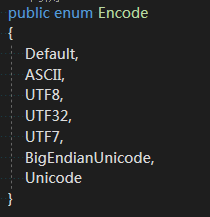WPF TextBox按字节长度限制输入
前两天做一个项目的时候,由于页面没有限制TextBox的输入长度,所以,后台直接报错了,超出数据库最大的长度。
数据库的长度是按照字节来计算的,而且不同的编码格式,汉字占用的字节长度又不相同,比如,我们用的是UTF8,一个汉字是3个字节,而默认的Default,一个汉字是2个字节。
TextBox有个MaxLength属性,但是这个属性是不太合乎要求的,因为这个长度,是限制了输入的长度,比如设置20,则无论是数字、字母、汉字最大的长度都是20个,但是,对于数据库来说,长度却不相同了,
所以,不能使用这个属性。
为了,统一解决下这个问题,所以给TextBox写了附加属性。
一、想要的效果
用了附加属性,想达到一个什么效果呢,就是像设置MaxLength一样,一旦到了数据库的字节长度,就不再能输入了。
因此,最开始想找一个限制输入的属性,可惜我学的太浅薄,没有找到相关的属性,因此,最后在同事的提醒下,可以记录上一次的内容,然后,如果超长,就用上一次的内容进行赋值


二、附加属性
既然要用附加属性,并且方便使用,那肯定要给开发者暴露出来至少两个:MaxByteLength用来设置最大的字节数,EncodeModel用来设置编码格式
EncodeModel是用Menu类型来做的,方便使用时直接敲内容

本来上面是直接想用Encoding来做的,奈何它是抽象类,只好,写个方法进行了一部转化,并且把Encoding类型的属性进行private。
大致上也就是这么一个思路,下面上代码,给需要的人使用。
public class MaxByteAttachedProperty : DependencyObject { public enum Encode { Default, ASCII, UTF8, UTF32, UTF7, BigEndianUnicode, Unicode } private static string GetPreText(DependencyObject obj) { return (string)obj.GetValue(PreTextProperty); } private static void SetPreText(DependencyObject obj, string value) { obj.SetValue(PreTextProperty, value); } // Using a DependencyProperty as the backing store for PreText. This enables animation, styling, binding, etc... private static readonly DependencyProperty PreTextProperty = DependencyProperty.RegisterAttached("PreText", typeof(string), typeof(MaxByteAttachedProperty), new PropertyMetadata("")); public static int GetMaxByteLength(DependencyObject obj) { return (int)obj.GetValue(MaxByteLengthProperty); } public static void SetMaxByteLength(DependencyObject obj, int value) { obj.SetValue(MaxByteLengthProperty, value); } // Using a DependencyProperty as the backing store for MaxByteLength. This enables animation, styling, binding, etc... public static readonly DependencyProperty MaxByteLengthProperty = DependencyProperty.RegisterAttached("MaxByteLength", typeof(int), typeof(MaxByteAttachedProperty), new PropertyMetadata(OnTextBoxPropertyChanged)); private static void OnTextBoxPropertyChanged(DependencyObject d, DependencyPropertyChangedEventArgs e) { TextBox tb = d as TextBox; if (tb == null) { return; } tb.PreviewTextInput += Tb_PreviewTextInput; } private static void Tb_PreviewTextInput(object sender, TextCompositionEventArgs e) { TextBox tb = sender as TextBox; if (IsOutMaxByteLength(tb.Text, tb)) { tb.Text = GetPreText(tb); tb.Select(tb.Text.Length, 0); return; } } public static Encode GetEncodeModel(DependencyObject obj) { return (Encode)obj.GetValue(EncodeModelProperty); } public static void SetEncodeModel(DependencyObject obj, Encode value) { obj.SetValue(EncodeModelProperty, value); } // Using a DependencyProperty as the backing store for EncodeM. This enables animation, styling, binding, etc... public static readonly DependencyProperty EncodeModelProperty = DependencyProperty.RegisterAttached("EncodeModel", typeof(Encode), typeof(MaxByteAttachedProperty), new PropertyMetadata(Encode.UTF8, OnEncodeModelChanged)); private static void OnEncodeModelChanged(DependencyObject d, DependencyPropertyChangedEventArgs e) { SetEM(d, GetEncodeModel(d)); } private static Encoding GetEncodingModel(DependencyObject obj) { return (Encoding)obj.GetValue(EncodingModelProperty); } private static void SetEncodingModel(DependencyObject obj, Encoding value) { obj.SetValue(EncodingModelProperty, value); } // Using a DependencyProperty as the backing store for EncodingModel. This enables animation, styling, binding, etc... private static readonly DependencyProperty EncodingModelProperty = DependencyProperty.RegisterAttached("EncodingModel", typeof(Encoding), typeof(MaxByteAttachedProperty), new PropertyMetadata(Encoding.UTF8)); private static void SetEM(DependencyObject obj, Encode e) { switch (e) { case Encode.Default: SetEncodingModel(obj, Encoding.Default); break; case Encode.ASCII: SetEncodingModel(obj, Encoding.ASCII); break; case Encode.UTF8: SetEncodingModel(obj, Encoding.UTF8); break; case Encode.UTF32: SetEncodingModel(obj, Encoding.UTF32); break; case Encode.UTF7: SetEncodingModel(obj, Encoding.UTF7); break; case Encode.BigEndianUnicode: SetEncodingModel(obj, Encoding.BigEndianUnicode); break; case Encode.Unicode: SetEncodingModel(obj, Encoding.Unicode); break; default: break; } } private static bool IsOutMaxByteLength(string txt, DependencyObject obj) { int txtLength = GetEncodingModel(obj).GetBytes(txt).Length;//文本长度 if (GetMaxByteLength(obj) >= txtLength) { SetPreText(obj, txt); return false; } return true; } }
使用方法如下:

MaxByteLength是必须设置的没有进行默认,EncodeModel可以不设置但是由于是我们自己用,所以默认是UTF8,可以自行修改代码,按照你们公司的编码格式,这样也就不用赋值了。
代码已修正,感谢Presia发现的BUG,疏忽了


 浙公网安备 33010602011771号
浙公网安备 33010602011771号